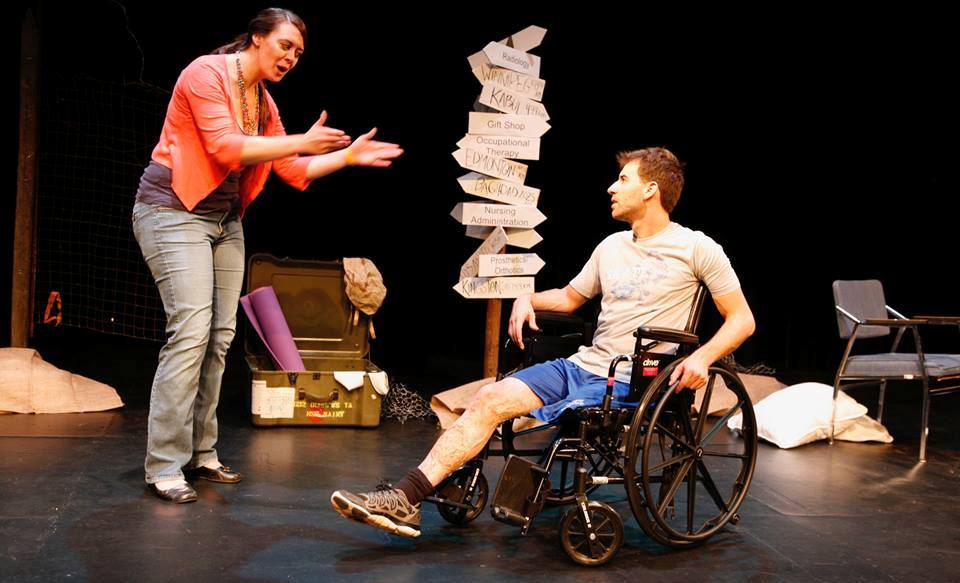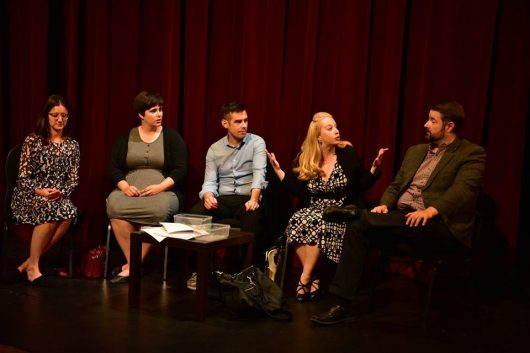FRINGE: 2 plays from UNEXPECTED artists
Posted on August 21, 2018 By Colin MacLean Entertainment, Front Slider, Theatre
 Walk (Stage 17) is unexpected because it is a new method of expression from one of Edmonton’s best writers – the Edmonton Journal’s Liane Faulder, and this is her stage version of a true story. The results demonstrate that she is a promising playwright.
Walk (Stage 17) is unexpected because it is a new method of expression from one of Edmonton’s best writers – the Edmonton Journal’s Liane Faulder, and this is her stage version of a true story. The results demonstrate that she is a promising playwright.
About 10 years ago the columnist wrote a book, The Long Walk Home, about a Canadian solider who lost both of his legs in Kandahar. Faulder felt that there was sufficient drama in the story to make a play. She wrote it and it won the 2015 Alberta Playwrights’ Network Discovery Prize. It is now getting its first professional stage production at the Fringe. She was right in feeling that the story could provide the basis for a solid stage presentation, though it’s not quite there yet.
The play begins with a loud explosion. We are in Afghanistan and Will (Ben Proulx) is the victim of a suicide bomber. He has lost a leg and is in danger of losing the other.
“I didn’t see it coming,” he says – meaning both the incident itself and the life to follow.
Will obsessively undergoes physio. He is determined to walk again and to preserve the leg he has left. In fact, he has left home to take up living in the physio unit. Often in great pain, he forces himself to greater and greater lengths – sometimes gulping pain pills to keep going.
“It is something I must do,“ he grits out.
His wife, Bonnie (Joelle Prefontaine), and 16 year old son, Luke (Ben Yip), can’t understand his compulsive drive.
“Come home, Dad,” begs his son. He is drifting and getting into his father’s painkillers. His wife is trying to cope but is having panic attacks. The distance growing between Will and his family is underlined when he complains, “I can’t be the only one who wants me to walk again.”
What makes Faulder’s play work best is the delicate balance between Will’s needs – which have turned into a destructive compulsion – and the emotional effects they’re having on his family.
The cast is good but has to struggle with some dialogue that hasn’t quite moved from the printed page. Director Michael Bradley has made an effort to flesh out the characters but Will’s wounded soldier tends to come off as an affliction rather than a human being afraid of losing control. I rather liked the somewhat ethereal character of Soldier (Bevin Dooley) who moves easily in and out of the story and carries a secret that affects the life of them all.
After a slow start, Faulder tightens the dramatic screws and the production moves from interesting to gripping.
3 ½ out of 5
***
 We’ve all seen those legal eagles on TV – grilling witnesses and transfixing juries with their colourful language and dramatic storytelling. Often it seems they missed their calling – they should be actors. Who could not be drawn in when Perry Mason forcefully points a finger and exclaims, “And the real perpetrator is …”
We’ve all seen those legal eagles on TV – grilling witnesses and transfixing juries with their colourful language and dramatic storytelling. Often it seems they missed their calling – they should be actors. Who could not be drawn in when Perry Mason forcefully points a finger and exclaims, “And the real perpetrator is …”
Apparently some of Edmonton’s implacable professional lawyers felt that, too, because for the past few years a number of them have formed the Novus Actors Company, under the benign banner of the Varscona Theatre, to present a play at the Fringe. They’ve proven to be pretty good at it, too.
They’re back this year and they’re going big – staging a new play The Many Loves Of Irene Sloane (Stage 12), written for them by the Fringe’s resident muse Stewart Lemoine. And they’ve employed the master himself to direct.
A group of people gather in a downtown condo when a note is left asking if anyone would be interested in forming a book club. Turns out no one has read the book, but one helpful member suggests, “I really like the title. Since it’s the only thing we’ve all read – let’s talk about that.” Another prospective reader joins and brings a short manuscript, called The Many Loves of Irene Sloane, written, but not finished, by her grandmother. Since they have nothing else to do, they decide to try and finish it.
At that moment, the lights come up on the other side of the stage and there is the narrator of the same story, and a new group of actors forming around her to act out the tale. The action continues until someone in the reading group takes exception to something going on – then gets up and joins the play across the stage. The lively relationship between the two groups and their constant intermixing is the central comic device of this gentle and diverting entertainment, generating much audience laughter. So does Lemoine’s exceedingly clever dialogue. One character observes, “I’m writing a book about her.” “Good,” is the reaction. “I’ve always felt she should come with an instruction manual.”
No excuse needs to be made for the acting abilities of these hooky-playing jurists. They may not be up to the standard of Lemoine’s ace stock company of Teatro La Quindicina, but they are just fine. They establish strong characters, work the jokes and exhibit great timing. Nothing wrong here, Your Honour.
Lemoine, canny director that he is, pushes them pell mell, so if there is a problem, it’s gone before you notice it. This show is slick and sophisticated and peppered with continuing chuckles and laughter. Case adjourned until next year.
4 out of 5











